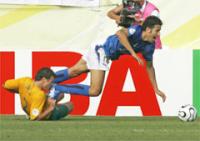The Goal is Goals
The last couple of days have been pretty lackluster for football, from the Holland–Portugal disaster, wherein 16 yellow cards and 2 red cards were dished out to the two out-of-control teams, to the Italy–Australia and Switzerland–Ukraine games, which treated us to over 200 minutes of scoreless football. 200 minutes of master class in defense and all of the buzz today is about diving in the penalty box. The day before, Germany took an early two goal lead and sat on it for a further boring 80 minutes and England had a sterling 3 seconds of play courtesy of a Beckham free kick in a 1–0 win. That’s a lot of strategic football for even the most hardened of fans. And yet, diving is on the top of the list of worries.
If you look at the cards to goals comparison, you’ll see there have been quite a few yellow cards. A few have been for diving, while others have been for delay of game. These are the things that FIFA is cracking down on these days. The large majority of the cards have been for excessively hard tackles, tackles from behind or tackles that are off the play. Players tend to flop when struck for several reasons:
- Getting hit hurts sometimes, no matter how much we want to think that each and every player on the pitch is a whining pussy
- Referees don’t call what they don’t see; a player who doesn’t embellish a legitimate foul and tries to stay on his feet is one who loses the advantage to a foul play
- They’re trying to cheat and get a good free kick or a penalty
 Grosso 'Dives'It’s the last accusation that is being thrown at Grosso of Italy, who went down in the box extremely late in extra time against Australia. The replay showed that Grosso probably could have avoided the defender who, having missed the ball neatly dinked around him, sprawled himself in a wild tackle at Grosso (the Italian coach said that he’d already shrugged off one foul at that point, whereas the Austalian coach says no fouls whatsoever occurred). Yeah, an athlete of Grosso’s capability should easily be able to avoid getting wiped out by a desperate tackle directly in front of him. True. But that’s not exactly his goal, is it? His goal is scoring goals. To that end, he did a sweet little maneuver to deke the last defender and was gearing up to shoot when suddenly the way to the ball is blocked by a wildly sliding Australian. Grosso’s goal is not to escape the game without getting hit—it’s to put that ball in the net. Our goal as fans is to see goals get scored, not to see skilled players threatened off the ball by illegal tackles. So Grosso makes no attempt to avoid the “wild assault of Australia midfielder Mark Bresciano” (Totti kills Oz hopes at death (Eurosport)) and goes sprawling quite theatrically on the ground. If he’d leapt over Bresciano, avoiding all contact, he’d have been rewarded with nothing for all of his effort—and wild, unskilled play would have won out.
Grosso 'Dives'It’s the last accusation that is being thrown at Grosso of Italy, who went down in the box extremely late in extra time against Australia. The replay showed that Grosso probably could have avoided the defender who, having missed the ball neatly dinked around him, sprawled himself in a wild tackle at Grosso (the Italian coach said that he’d already shrugged off one foul at that point, whereas the Austalian coach says no fouls whatsoever occurred). Yeah, an athlete of Grosso’s capability should easily be able to avoid getting wiped out by a desperate tackle directly in front of him. True. But that’s not exactly his goal, is it? His goal is scoring goals. To that end, he did a sweet little maneuver to deke the last defender and was gearing up to shoot when suddenly the way to the ball is blocked by a wildly sliding Australian. Grosso’s goal is not to escape the game without getting hit—it’s to put that ball in the net. Our goal as fans is to see goals get scored, not to see skilled players threatened off the ball by illegal tackles. So Grosso makes no attempt to avoid the “wild assault of Australia midfielder Mark Bresciano” (Totti kills Oz hopes at death (Eurosport)) and goes sprawling quite theatrically on the ground. If he’d leapt over Bresciano, avoiding all contact, he’d have been rewarded with nothing for all of his effort—and wild, unskilled play would have won out.
So to those that ask why such a skilled athlete shouldn’t be able to avoid such a wild tackle, the question in response is “why should he?” Letting hard tackles and wild play terrorize the best players—the ones people tune in to watch—into careful play isn’t good for anybody. It leads to the highly defensive, scoreless matches we’ve been seeing in the last few days. Should out-and-out diving be punished? Yes. And it has been in this tournament. Compared to other years, notorious diving teams like some South American clubs, Italy, Spain and others are doing a lot less of it for fear of yellow cards. Embellishing a legitimate foul is something we’re going to have to live with because the alternative is broken games with no flow and “goon squads” á la ice hockey. To be honest, the large majority of replays where it appears a dive took place showed a defender clipping at least a part of a foot or leg or tugging some part of the uniform. That the action causes a healthy, strong player to actually fall down is ridiculous. But without falling down, the referee has no reason to stop play and the defenseman gets away with using dirty play to nullify a scoring play, of which there are precious few of in the first place.